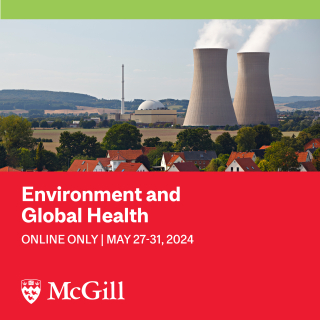
View courses by topic or week
 Environment and Global Health | May 27- 31, 2024
Environment and Global Health | May 27- 31, 2024Online only. Course will be live approximately 8:00am-12:00pm (Montreal time) May 27 – 31, 2024. All teaching will be recorded and available to view until July 1, 2024.
Global health crises unfolding around the world are inextricably linked to the sustainability of vital bio-physical systems. Environmental and global health approaches explore the interdependent relationship between human health and natural ecosystems. These approaches study the impacts on populations and societies (transcending borders), and in particular those most vulnerable and the ways in which we might explore collective solutions. This course examines the environment and global health issues from healthcare practitioner, environmental science, public health and policy perspectives. It is designed for those who wish to gain insight into how human health and well-being is directly affected by environmental factors and to explore a variety of approaches to environment and health problems on macro and micro-scales.
 Neil Arya, BASc, MD, CCFP, FCFP, DLitt
Neil Arya, BASc, MD, CCFP, FCFP, DLitt
Founding Board President PEGASUS Institute
Adjunct Professor- Environment and Resource Studies, University of Waterloo
Former Chair Ontario College of Family Physicians (OCFP) Environmental Health Committee and member Pest Management Advisory Council of Health Canada
Detailed biography of Dr. Arya
 Nolwenn Noisel, PhD
Nolwenn Noisel, PhD
Assistant Professor, Environmental and Occupational Health
Department, School of Public Health, University of Montreal
Researcher, Centre for Public Health Research (CReSP)
Speakers will share experiences and expertise on local and global issues such as: climate change, pesticides, air, water and food contamination related to extractive industries, agricultural practices, different ways of knowing and advocacy from health perspectives. Course participants will also be encouraged to reflect and share their own observations and examples.
Transdisciplinary group including health practitioners, public health and environmental studies graduate students and faculty, programme managers, policymakers, advocates with an interest in global and community health, the relationship between human health and the physical environment, ethics, political, development and governance considerations
Limited to 100 online participants.